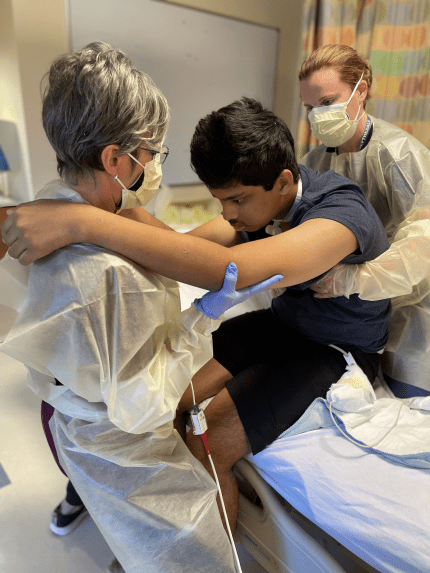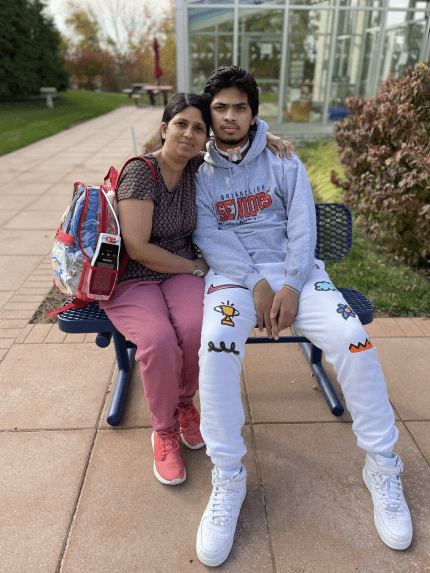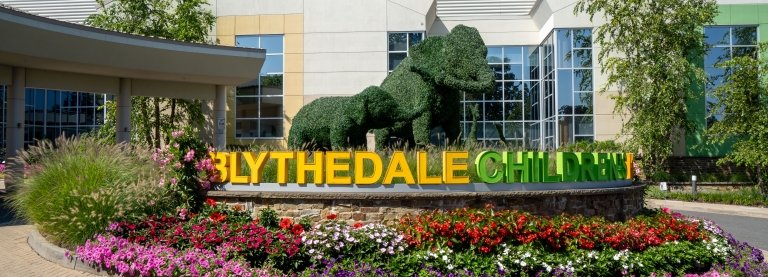Rahul's Recovery
Transitioning back after a Traumatic Brain Injury made easier through Blythedale's Day Hospital Program.
Rahul was preparing to enter his senior year at Briarcliff High School last August when he lost control of his motorcycle while biking with friends. He sustained a very severe traumatic brain injury and was in a minimally conscious state when he was admitted to Blythedale Children’s Hospital just one month later for comprehensive rehabilitation.

Blythedale's Traumatic Brain Injury Unit - the only dedicated post-acute pediatric brain injury unit in New York State has a multidisciplinary clinical team with highly specialized expertise in treating the most severe types of brain injuries, like Rahul's. "When he first came to Blythedale, he was in what we call a disorder of consciousness," said William Watson, Ph.D., Director of Neuropsychology at Blythedale Children's Hospital. "His brain injury was so severe he was only able to generally respond to some things in his environment." For Rahul, hearing songs he liked and his mother's voice helped him begin to emerge from his minimally conscious state. At this time he began participating in intensive physical, occupational, speech and feeding therapies to help build his strength and cognition.
Dr. Watson recalls one specific Friday in the middle of October as a milestone moment.
"I was walking out one day, and I remember Rahul's mom saying, 'you've got to come in and talk to Rahul because he just started talking!' He was able to answer a lot of questions consistently and it was like the light went on." Rahul says he remembers that day as well. "It wasn't like one day I just woke up," he said. "Slowly, my eyes were getting clearer. I was really confused, and I didn't know where I was. When I asked my mom what happened and she told me, I didn't believe her. I did not believe I crashed, or I rode a bike."
Regaining his memory was only one part of his recovery. Rahul had to relearn how to walk, talk, eat, and breathe on his own.
"Walking was really hard at first," said Rahul.
In physical therapy, he worked on strengthening his body through core exercises, progressing from walking to jogging. In his occupational therapy sessions, he worked on his fine motor control and coordination. In speech therapy, he worked on his articulation of words and certain sounds, as well as memory. Eventually, he was able to have both his gastric and tracheotomy tubes removed.
Once he was medically stable and independently walking on his own, Rahul was discharged home.
"Everybody congratulated me as I was leaving," he said. "It may have been a small thing, a small part of the job, but to me, it made a difference. To me, going home was good but it helped me in that transition."
Rahul transitioned to Blythedale's Day Hospital program. The unique program offers patients medical care that is similar to an acute patient setting with intensive therapy and medical supervision, but allows the patients to be at home. Rahul also attends Blythedale's onsite public school, Mount Pleasant Blythedale Union Free School District. Each year, the school educates between 300 to 350 inpatient and Day Hospital patients.
"The cognitive deficits that accompany patients with traumatic brain injury can be really challenging to transition back immediately to their community school," said Divya Lakhaney, M.D. Unit Chief of the Robert Stone Day Hospital at Blythedale Children's Hospital. "Having a school onsite is really beneficial because it allows our patients to work with their therapists during sessions that are really focused on that cognitive rehabilitation piece, in addition to those motor skills that they are working on."

Rahul has made tremendous progress with his cognitive skills at Mount Pleasant Blythedale.
"The teachers are super understanding," he said. "It was really hard at first, but they listened."
During school, Rahul attends classes with other students at his grade level in Math, Music, Science, Social Studies, and English, which is his favorite class.
Rahul is expected to transition back to Briarcliff High School to finish his senior year in April.
"This happened at really hard time in his development," said Watson. "We're so excited to have his recovery line up in a way that he can return to his school in the end and graduate with his class, which, I think given how severe his brain injury was and where he started with us last fall to how far he's come, is really exciting."



